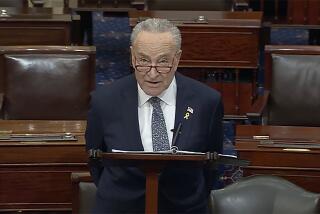Klamath Decisions to Be Probed
Hit with allegations that the Bush administration is playing politics in the drought-plagued Klamath River Basin, the U.S. Department of the Interior will investigate whether White House political strategist Karl Rove helped shape a decision to provide more water to farmers at the expense of endangered fish.
The probe by the department’s inspector general comes at the request of Sen. John F. Kerry (D-Mass.), who is a presidential candidate.
Kerry accused the president and his top aides of acting as if federal agencies “are a division of the Republican National Committee and at their disposal to give out political favors.” He said Klamath water-allocation decisions -- pitting farmers against environmentalists, tribes and commercial anglers who want to protect the fish -- should have been based on law and science, “not a political operative’s agenda, polls and campaign priorities.”
Mark Pfeifle, an Interior Department spokesman, defended the government’s water-allotment decisions, saying they had been based on sound science. He characterized Kerry’s broadside as “partisan sniping” on the campaign trail.
Charges of political favoritism have long clouded the process of allocating the Klamath River’s waters. Bush foes complain that the administration has favored farmers, a key constituency in the 2000 election.
During the deep 2001 drought in the Klamath basin, farmers in the fertile area stretching along the Oregon-California border saw their water allocations slashed to help two species of endangered suckerfish in Upper Klamath Lake and the threatened coho salmon in the Klamath River. Bush administration officials responded by providing disaster assistance and a jolt of water to the beleaguered farmers.
Over the next year, federal water officials fashioned a plan that provided more water to agriculture and less to fish. Environmentalists, fishermen and tribes complained that the fish would be hit hard, and in the fall of 2002 more than 30,000 salmon perished in the lower reaches of the Klamath River.
Although biologists in California said the low water flows had brought on a disease outbreak that killed the fish, administration officials said the cause remained unclear. The U.S. Fish and Wildlife Service has not finished a long-awaited study.
In July, a Wall Street Journal article detailed efforts by Rove to weigh in on water-management issues in the Klamath and other Interior Department decisions. According to that story, Rove made a presentation to Interior Department officials during a January 2002 retreat, taking pains to connect regulatory actions with Republican prospects in the coming elections. The briefing followed a trip by Bush and Rove to Oregon to discuss the Klamath and other issues.
Environmentalists said the article had raised serious questions about whether politics was taking precedence over science.
“I think the administration has twisted the Klamath situation for its own political purposes for a long time,” said Jay Watson of the Wilderness Society. “They’re serving their farm constituency at the expense of a lot of others downriver.”
Rep. Mike Thompson (D-Eureka), whose Northern California district includes the lower Klamath Basin, said the investigation “isn’t only about the largest fish kill in our nation’s history.... It is about the integrity of our government and the public’s right to know if it has been misled.”
Earl E. Devaney, Interior Department’s inspector general, said in a letter to Kerry that the investigation would look into whether the Klamath decision-making process had “deviated from the norm.” The probe will address questions about the adequacy of the science and any suppressed information.
Bush foes said the administration has brushed aside charges from Michael Kelly, a U.S. Fish and Wildlife scientist who sought whistle-blower protection after alleging that decisions on river flows had been colored by politics.
In addition, environmentalists claim the administration has suppressed a report by Dr. Thomas E. Hardy, an environmental engineering professor at Utah State University, supporting higher downstream flows.
Pfeifle countered that decisions made by the Interior Department had been based on the best available science, in particular on a report from the National Academy of Sciences that suggested lower river flows would not harm salmon.
More to Read
Get the L.A. Times Politics newsletter
Deeply reported insights into legislation, politics and policy from Sacramento, Washington and beyond. In your inbox three times per week.
You may occasionally receive promotional content from the Los Angeles Times.






